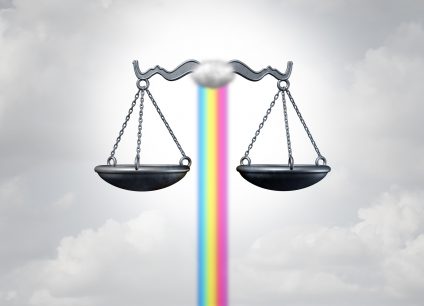
One of the most contentious aspects of the currently roiling debate about the rights of transgender persons is that both sides imagine that they are defending the principle of justice.
Trans advocates are absolutely, positively, unalterably convinced that justice REQUIRES not merely acceptance of transgender individuals, but capitulation to all their demands. Anyone who doesn’t agree is angrily labeled transphobic or worse. Women’s rights advocates are absolutely, positively, unalterably convinced that justice does NOT require acceptance of transgender demands, especially if those demands pose a threat to women. Anyone who doesn’t agree is angrily labeled delusional or worse.
Both sides often do agree that the dispute rests on the answer to a simple question, “who is a woman (or a man)?” In contrast, I am coming to believe that the dispute rests on the answer to an entirely different question about justice. The question is not simply “what does justice require?” The real question at the heart of these debates “what is justice?”
Trans advocates often hold a view of justice that resembles a moral caste system based both on group identity and history of oppression. Arguments are easily adjudicated by reference to the caste system with those in a higher caste automatically correct. We might describe this system as “justice as reparation.”
Therefore, when a woman demands something from a man (or accuses a man of assault), the moral caste system requires that we accept the woman’s demands or believe her accusation, since as a victim of misogyny she is in a higher caste. In contrast, if a trans woman demands something of a cis woman, the moral caste system REQUIRES that we accede to the trans woman’s demands since — by virtue of greater oppression — a trans woman is in an even higher moral caste.
The virtue of this system of justice is it does away with messy details like determining who might be correct or whose demands might be reasonable or unreasonable. There’s no need to treat people as individuals who could be right or wrong; the relative position of their caste determines all.
The major defect in this system of justice is … it does away with messy details like determining who might be correct or whose demands might be reasonable or unreasonable. Instead of treating people as individuals whose demands should be adjudicated on the merits, it reduces them to members of a specific group.
If you subscribe to a system of justice based on a moral caste system it is obvious that any woman who refuses to knuckle under to demands of trans women must — by the system’s definition — be wrong. Indeed, refusal to knuckle under is — by the system’s definition — unalterably transphobic and deserves every vicious slur and accusation (“your refusal to use gender neutral language to describe pregnancy will KILL trans women!!!”) you can throw at her.
I, and many millions of other like me, subscribe to a very different system of justice — justice as fairness — one based largely on that described by the great 20th Century political philosopher John Rawls. Rawls wrote that if we want to know what justice requires of us, we ought to imagine the world we would want if we didn’t know the position that we would occupy in that world. In other words, justice is what we would choose if we didn’t know if we were rich or poor, Black or white, brilliant or plodding, talented or talentless, … trans or cis. If we didn’t know our specific circumstances we wouldn’t be able to tailor our principles to benefit ourselves or our friends.
In determining whether trans women should be allowed to compete in women’s sports, the issue is not who has a history of greater oppression but how can we balance the interests of both groups. If you imagine yourself as the trans woman who wants to compete you might arrive at one conclusion. If you imagine yourself as the cis woman whose athletic career will be blighted by allowing trans women to compete you might arrive at the opposite conclusion. But what if you didn’t know which one you were? What would you decide then? You would likely aim for the fairest solution. That’s not transphobia.
In determining whether trans women should be housed in women’s prisons, the issue is not who has a history of greater oppression but how can we balance the interests of both groups. If you imagine yourself as the trans woman you might arrive at one conclusion. If you imagine yourself as the cis woman who could be raped you might arrive at the opposite conclusion. But what if you didn’t know which one you were? What would you decide then? You would likely aim for the fairest solution. That’s not transphobia.
Therefore, the fundamental question at issue is not “who is a woman?” but “what is justice?” when the interests of trans women and cis women are in conflict. If you believe in justice as reparation you must acknowledge that those who believe in justice as fairness are not transphobic. And if you believe in justice as fairness you must stop calling trans people delusional since that is fundamentally unfair and unjust.

